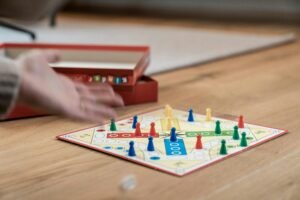





Board Games | For millennia, people have used board games as a means of social interaction, strategy, and pleasure. They vary from historical games played by kings in antiquity to contemporary games that have become family favorites worldwide. The history of board games, its various varieties, well-known examples, and the reasons why they remain a popular past time for people of all ages will all be covered in this article.
A Brief History of Board Games
For thousands of years, board games have been a component of human society. Senet, the first known board game, was played about 3100 BC in ancient Egypt. This game, which was frequently discovered in pharaohs’ tombs, represented the soul’s journey through the afterlife.
Go is another old game that was created in China over 2,500 years ago and is being played there today. Tacticians love it for its straightforward rules and vast strategic potential.
The game of Chaturanga originated in India in the sixth century AD, and it eventually grew into the game of Chess, which traveled across Europe and became an essential part of Western intellectual culture.
The variety of board games that we now see, from the easy and fun for the whole family to the intricate and strategic, developed throughout time as they traveled across cultural boundaries.
Types of Board Games
There are several kinds of board games, each providing a distinct experience. These include:
1. Classic Games
These are the classic games that people have been playing for ages.
- Chess: A strategy-based game in which two players compete intellectually on a checkered board.
- Checkers: A more straightforward but still strategic game in which players must hop over their opponent’s pieces to capture their pieces.
- Backgammon: Players compete to remove their pieces from the board in one of the oldest board games known to man. It combines strategy and chance.
2.Strategy Games
Tactical thinking and meticulous strategy are necessary for these games.
- Risk is a worldwide dominance game in which players form alliances and send armies to seize territory.
- In the game Catan, players gather resources and construct towns in an effort to take control of the island.
- Ticket to Ride is a national route-building game in which players must gather cards in order to claim railroad routes.
3.Cooppertive Games
Players collaborate to achieve a common objective in cooperative games, frequently against the game itself.
- Pandemic: Before time runs out, players must work together to develop treatments and stop the spread of illnesses throughout the planet.
- In the cooperative game Forbidden Island, players must gather wealth from a sinking island and make their way off before it’s too late.
- Spirit Island is a challenging game in which players take on the role of spirits guarding their island from invading spirits.
4. Party Games
These games emphasize enjoyment, engagement, and frequently comedy. They are meant for bigger groups.
- Teams play in the word association game Codenames to identify their agents using just one word as a clue.
- In the game of Pictionary, players must create drawings to aid their team in identifying a word or phrase.
- Mixing “Telephone” with sketching, participants attempt to predict what other people have drawn, frequently leading to humorous outcomes.
5. Family Games
These games are made to be played by players of all ages and frequently emphasize enjoyment and simplicity.
- The goal of the classic game Monopoly is to bankrupt rivals by purchasing, trading, and developing properties.
- Scrabble: A word game in which players use letter tiles to form words on a board in order to score points.
- The Game of Life: Players make decisions that affect their success as they move through life’s events, from college to retirement.
6. Thematic Games
Immersion in a particular tale or environment is achieved by the use of elaborate narratives and role-playing components in thematic games.
- Betrayal at House on the Hill: A player will eventually betray the other players as they explore a frightening home.
- Arkham Horror is a cooperative game where players fight cosmic creatures in a Lovecraftian setting.
- In the expansive campaign game Gloomhaven, users assume the role of mercenaries in a dystopian setting.
Benefit of Playing Board Games
Board games have several advantages that support mental, social, and emotional health in addition to being enjoyable activities.
1.Mental Stimulation
- Cognitive Skills: Playing board games, like Scrabble and Chess, can improve your memory, critical thinking, and problem-solving skills.
- Strategic Thinking: In games such as Catan and Risk, players must be able to strategize, anticipate, and adjust to changing circumstances.
2. Social Interaction
- Bonding: Playing board games together encourages friendly rivalry, face-to-face communication, and collaboration.
- Communication Skills: Players are encouraged to work as a team and communicate clearly in cooperative games like Pandemic.
3. Relaxation and Stress Reduction
- Escapism: Because themed games are so engrossing, they may help players escape from the difficulties of ordinary life by immersing them in a new setting.
- Joy and Laughter: Playing party games may bring people together to laugh and celebrate, which can improve mood and relieve stress.
4. Educational Value
- Learning via Play: A lot of games are made to provide interesting lessons on subjects like arithmetic, language, geography, and history.
- Playing games such as Pictionary and Telestrations may foster both creativity and imagination.
The Development and Prospects of Board Games
Compared to their ancient roots, board games have evolved significantly. New board games are constantly being published in the booming modern board game market, which is frequently financed by websites like Kickstarter. Playing these games with friends and family from a distance is now feasible thanks to the popularity of digital board games and internet platforms.
Board games appear to have a bright future thanks to ongoing innovation in mechanics, themes, and game design. A growing trend in gaming are hybrid games, which blend digital and physical components to create fresh, entertaining gameplay experiences.
Conclusion
A classic kind of entertainment, board games have something to offer everyone. There is a board game out there for everyone, regardless of whether you enjoy cooperative adventures, fun party games, or rigorous strategy. They give hours of entertainment as well as a respite from the daily grind, socialization, and improvement of cognitive abilities.
